Charismatic Leadership: Impact on Employee Performance
VerifiedAdded on 2022/09/18
|6
|1072
|28
Essay
AI Summary
This essay delves into the multifaceted impact of charismatic leadership on both employees and organizational outcomes. It begins by defining charismatic leadership, highlighting its core characteristics such as sincerity, effective communication, compassion, risk-taking ability, and the capacity to inspire and motivate. The essay then explores why employees often prefer charismatic leaders, emphasizing the leaders' ability to foster emotional connections, provide respect and empathy, and communicate effectively. Furthermore, it examines the positive effects of charismatic leadership on employee performance and organizational growth, including increased employee loyalty, passion for work, and the creation of a creative and innovative environment that leads to a competitive advantage in the market. The essay concludes by underscoring the effectiveness of this leadership style in transforming individuals and organizational operational styles, making it a highly desirable and impactful leadership approach.
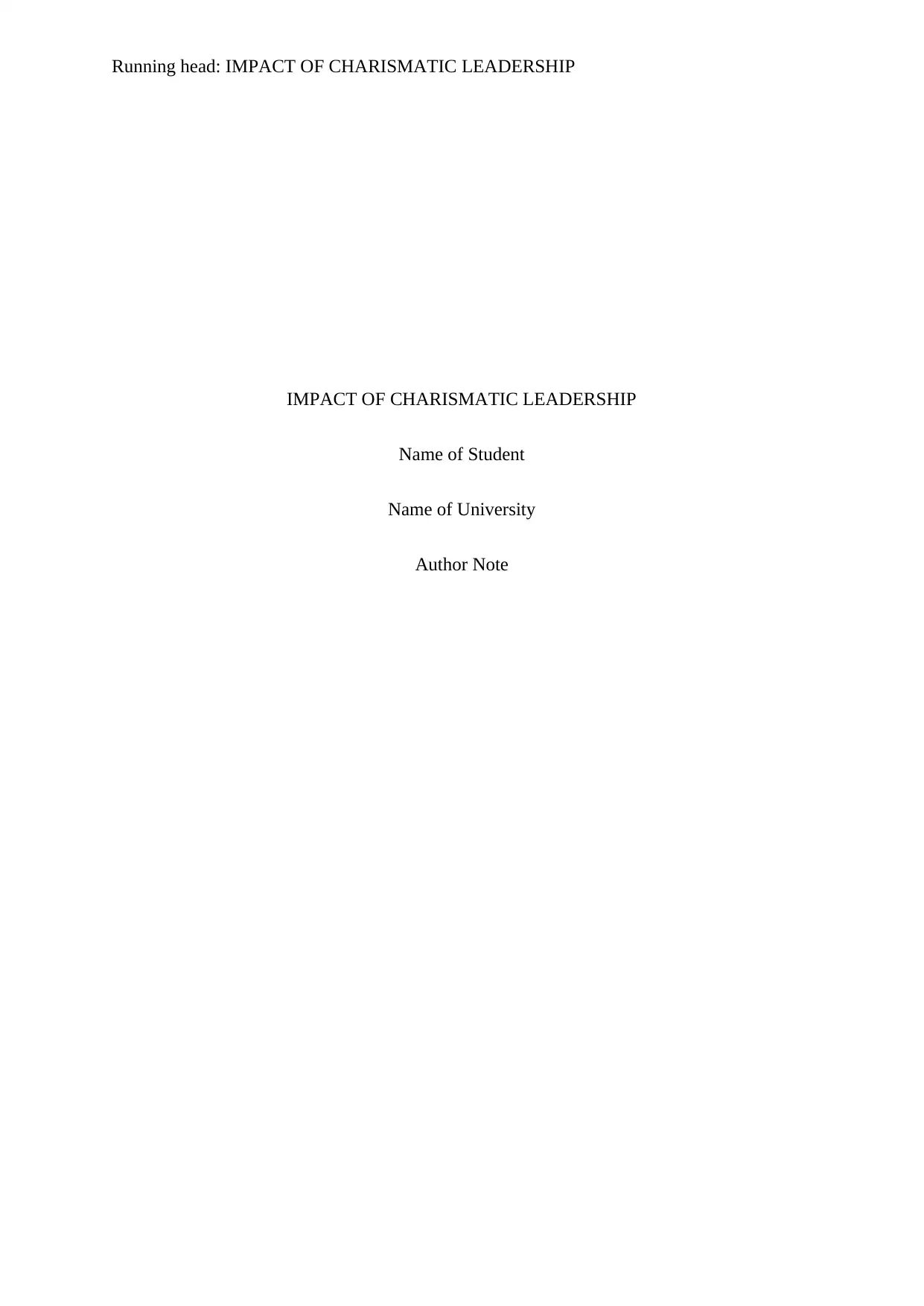
Running head: IMPACT OF CHARISMATIC LEADERSHIP
IMPACT OF CHARISMATIC LEADERSHIP
Name of Student
Name of University
Author Note
IMPACT OF CHARISMATIC LEADERSHIP
Name of Student
Name of University
Author Note
Paraphrase This Document
Need a fresh take? Get an instant paraphrase of this document with our AI Paraphraser
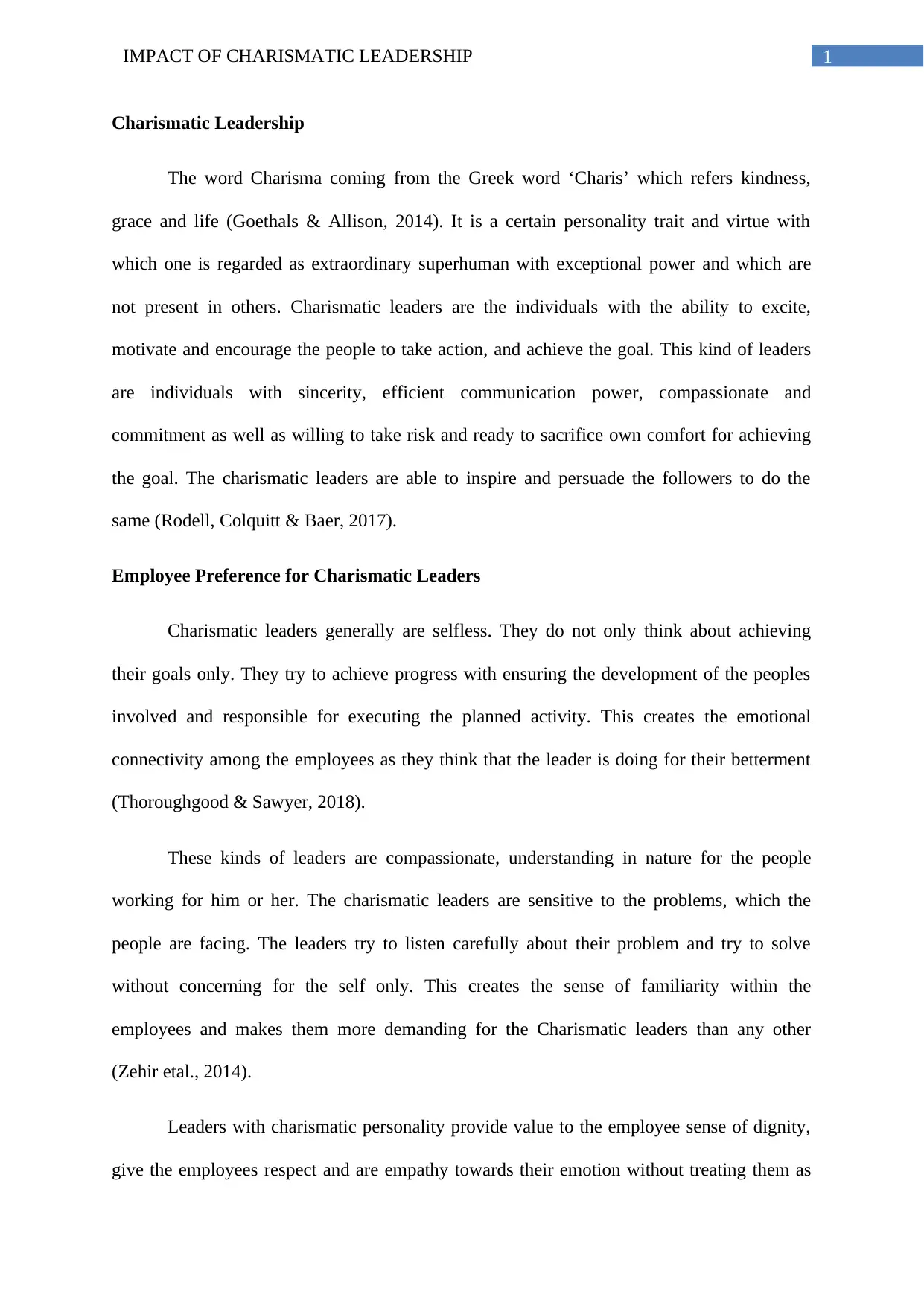
1IMPACT OF CHARISMATIC LEADERSHIP
Charismatic Leadership
The word Charisma coming from the Greek word ‘Charis’ which refers kindness,
grace and life (Goethals & Allison, 2014). It is a certain personality trait and virtue with
which one is regarded as extraordinary superhuman with exceptional power and which are
not present in others. Charismatic leaders are the individuals with the ability to excite,
motivate and encourage the people to take action, and achieve the goal. This kind of leaders
are individuals with sincerity, efficient communication power, compassionate and
commitment as well as willing to take risk and ready to sacrifice own comfort for achieving
the goal. The charismatic leaders are able to inspire and persuade the followers to do the
same (Rodell, Colquitt & Baer, 2017).
Employee Preference for Charismatic Leaders
Charismatic leaders generally are selfless. They do not only think about achieving
their goals only. They try to achieve progress with ensuring the development of the peoples
involved and responsible for executing the planned activity. This creates the emotional
connectivity among the employees as they think that the leader is doing for their betterment
(Thoroughgood & Sawyer, 2018).
These kinds of leaders are compassionate, understanding in nature for the people
working for him or her. The charismatic leaders are sensitive to the problems, which the
people are facing. The leaders try to listen carefully about their problem and try to solve
without concerning for the self only. This creates the sense of familiarity within the
employees and makes them more demanding for the Charismatic leaders than any other
(Zehir etal., 2014).
Leaders with charismatic personality provide value to the employee sense of dignity,
give the employees respect and are empathy towards their emotion without treating them as
Charismatic Leadership
The word Charisma coming from the Greek word ‘Charis’ which refers kindness,
grace and life (Goethals & Allison, 2014). It is a certain personality trait and virtue with
which one is regarded as extraordinary superhuman with exceptional power and which are
not present in others. Charismatic leaders are the individuals with the ability to excite,
motivate and encourage the people to take action, and achieve the goal. This kind of leaders
are individuals with sincerity, efficient communication power, compassionate and
commitment as well as willing to take risk and ready to sacrifice own comfort for achieving
the goal. The charismatic leaders are able to inspire and persuade the followers to do the
same (Rodell, Colquitt & Baer, 2017).
Employee Preference for Charismatic Leaders
Charismatic leaders generally are selfless. They do not only think about achieving
their goals only. They try to achieve progress with ensuring the development of the peoples
involved and responsible for executing the planned activity. This creates the emotional
connectivity among the employees as they think that the leader is doing for their betterment
(Thoroughgood & Sawyer, 2018).
These kinds of leaders are compassionate, understanding in nature for the people
working for him or her. The charismatic leaders are sensitive to the problems, which the
people are facing. The leaders try to listen carefully about their problem and try to solve
without concerning for the self only. This creates the sense of familiarity within the
employees and makes them more demanding for the Charismatic leaders than any other
(Zehir etal., 2014).
Leaders with charismatic personality provide value to the employee sense of dignity,
give the employees respect and are empathy towards their emotion without treating them as
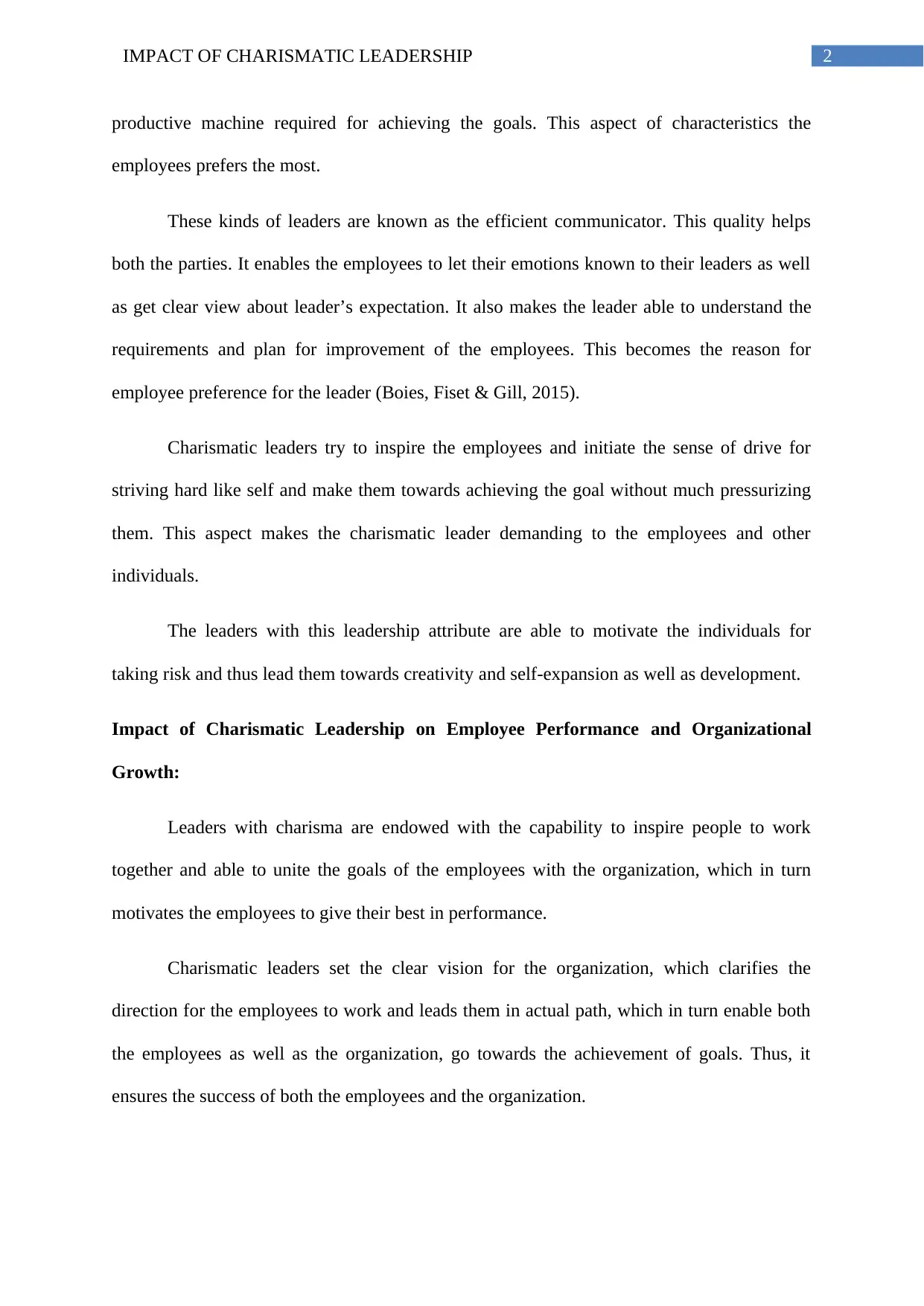
2IMPACT OF CHARISMATIC LEADERSHIP
productive machine required for achieving the goals. This aspect of characteristics the
employees prefers the most.
These kinds of leaders are known as the efficient communicator. This quality helps
both the parties. It enables the employees to let their emotions known to their leaders as well
as get clear view about leader’s expectation. It also makes the leader able to understand the
requirements and plan for improvement of the employees. This becomes the reason for
employee preference for the leader (Boies, Fiset & Gill, 2015).
Charismatic leaders try to inspire the employees and initiate the sense of drive for
striving hard like self and make them towards achieving the goal without much pressurizing
them. This aspect makes the charismatic leader demanding to the employees and other
individuals.
The leaders with this leadership attribute are able to motivate the individuals for
taking risk and thus lead them towards creativity and self-expansion as well as development.
Impact of Charismatic Leadership on Employee Performance and Organizational
Growth:
Leaders with charisma are endowed with the capability to inspire people to work
together and able to unite the goals of the employees with the organization, which in turn
motivates the employees to give their best in performance.
Charismatic leaders set the clear vision for the organization, which clarifies the
direction for the employees to work and leads them in actual path, which in turn enable both
the employees as well as the organization, go towards the achievement of goals. Thus, it
ensures the success of both the employees and the organization.
productive machine required for achieving the goals. This aspect of characteristics the
employees prefers the most.
These kinds of leaders are known as the efficient communicator. This quality helps
both the parties. It enables the employees to let their emotions known to their leaders as well
as get clear view about leader’s expectation. It also makes the leader able to understand the
requirements and plan for improvement of the employees. This becomes the reason for
employee preference for the leader (Boies, Fiset & Gill, 2015).
Charismatic leaders try to inspire the employees and initiate the sense of drive for
striving hard like self and make them towards achieving the goal without much pressurizing
them. This aspect makes the charismatic leader demanding to the employees and other
individuals.
The leaders with this leadership attribute are able to motivate the individuals for
taking risk and thus lead them towards creativity and self-expansion as well as development.
Impact of Charismatic Leadership on Employee Performance and Organizational
Growth:
Leaders with charisma are endowed with the capability to inspire people to work
together and able to unite the goals of the employees with the organization, which in turn
motivates the employees to give their best in performance.
Charismatic leaders set the clear vision for the organization, which clarifies the
direction for the employees to work and leads them in actual path, which in turn enable both
the employees as well as the organization, go towards the achievement of goals. Thus, it
ensures the success of both the employees and the organization.
⊘ This is a preview!⊘
Do you want full access?
Subscribe today to unlock all pages.

Trusted by 1+ million students worldwide
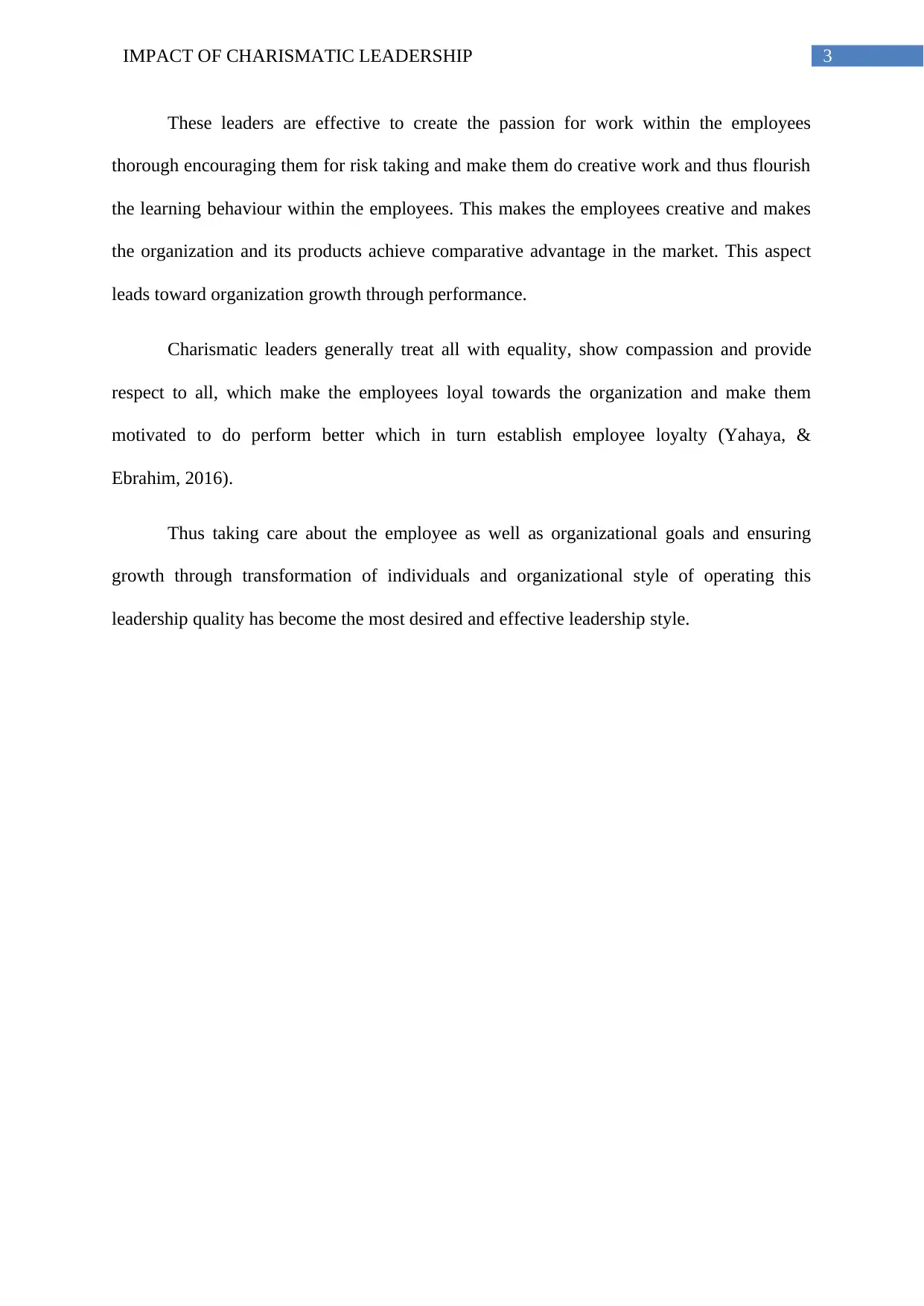
3IMPACT OF CHARISMATIC LEADERSHIP
These leaders are effective to create the passion for work within the employees
thorough encouraging them for risk taking and make them do creative work and thus flourish
the learning behaviour within the employees. This makes the employees creative and makes
the organization and its products achieve comparative advantage in the market. This aspect
leads toward organization growth through performance.
Charismatic leaders generally treat all with equality, show compassion and provide
respect to all, which make the employees loyal towards the organization and make them
motivated to do perform better which in turn establish employee loyalty (Yahaya, &
Ebrahim, 2016).
Thus taking care about the employee as well as organizational goals and ensuring
growth through transformation of individuals and organizational style of operating this
leadership quality has become the most desired and effective leadership style.
These leaders are effective to create the passion for work within the employees
thorough encouraging them for risk taking and make them do creative work and thus flourish
the learning behaviour within the employees. This makes the employees creative and makes
the organization and its products achieve comparative advantage in the market. This aspect
leads toward organization growth through performance.
Charismatic leaders generally treat all with equality, show compassion and provide
respect to all, which make the employees loyal towards the organization and make them
motivated to do perform better which in turn establish employee loyalty (Yahaya, &
Ebrahim, 2016).
Thus taking care about the employee as well as organizational goals and ensuring
growth through transformation of individuals and organizational style of operating this
leadership quality has become the most desired and effective leadership style.
Paraphrase This Document
Need a fresh take? Get an instant paraphrase of this document with our AI Paraphraser
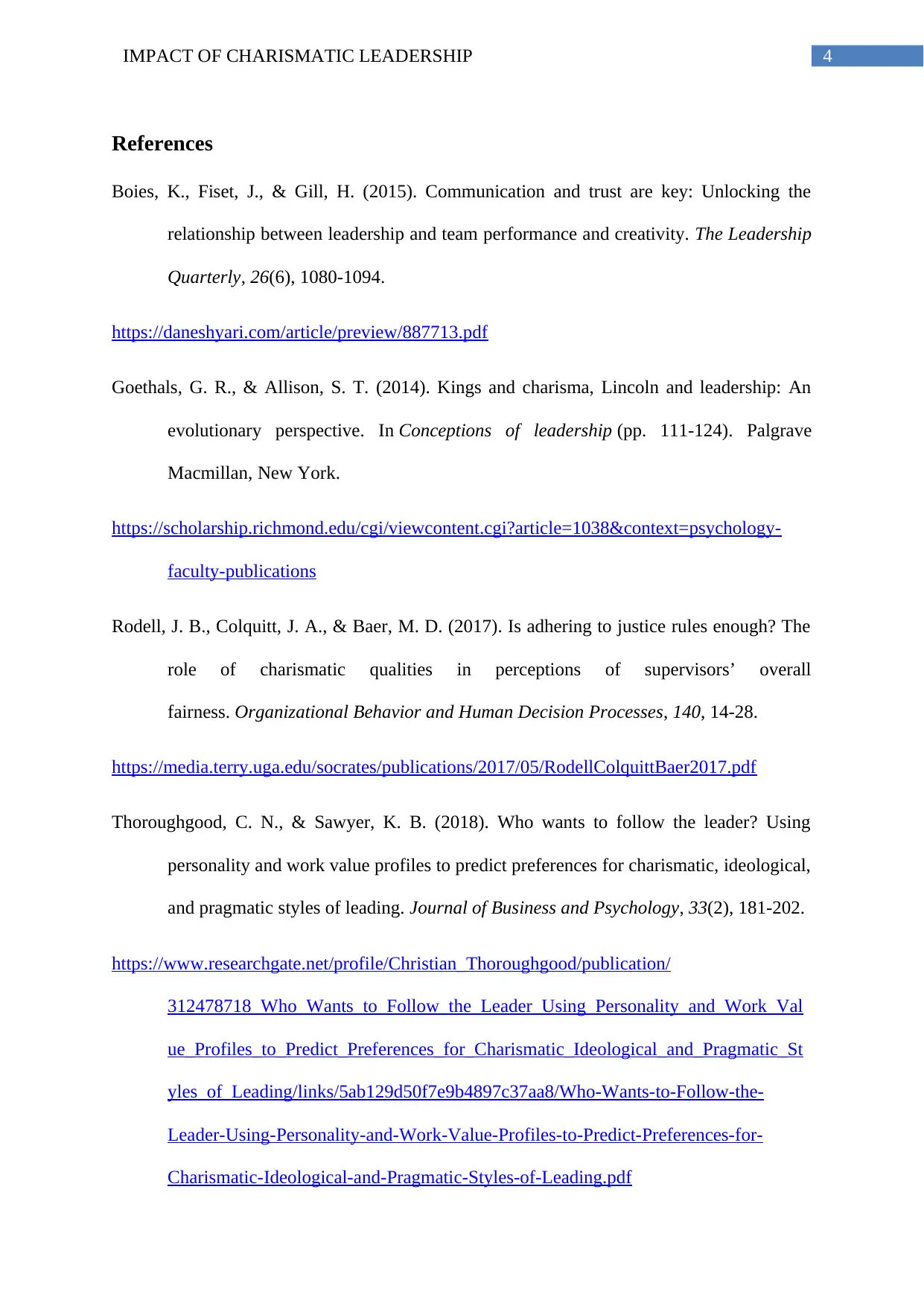
4IMPACT OF CHARISMATIC LEADERSHIP
References
Boies, K., Fiset, J., & Gill, H. (2015). Communication and trust are key: Unlocking the
relationship between leadership and team performance and creativity. The Leadership
Quarterly, 26(6), 1080-1094.
https://daneshyari.com/article/preview/887713.pdf
Goethals, G. R., & Allison, S. T. (2014). Kings and charisma, Lincoln and leadership: An
evolutionary perspective. In Conceptions of leadership (pp. 111-124). Palgrave
Macmillan, New York.
https://scholarship.richmond.edu/cgi/viewcontent.cgi?article=1038&context=psychology-
faculty-publications
Rodell, J. B., Colquitt, J. A., & Baer, M. D. (2017). Is adhering to justice rules enough? The
role of charismatic qualities in perceptions of supervisors’ overall
fairness. Organizational Behavior and Human Decision Processes, 140, 14-28.
https://media.terry.uga.edu/socrates/publications/2017/05/RodellColquittBaer2017.pdf
Thoroughgood, C. N., & Sawyer, K. B. (2018). Who wants to follow the leader? Using
personality and work value profiles to predict preferences for charismatic, ideological,
and pragmatic styles of leading. Journal of Business and Psychology, 33(2), 181-202.
https://www.researchgate.net/profile/Christian_Thoroughgood/publication/
312478718_Who_Wants_to_Follow_the_Leader_Using_Personality_and_Work_Val
ue_Profiles_to_Predict_Preferences_for_Charismatic_Ideological_and_Pragmatic_St
yles_of_Leading/links/5ab129d50f7e9b4897c37aa8/Who-Wants-to-Follow-the-
Leader-Using-Personality-and-Work-Value-Profiles-to-Predict-Preferences-for-
Charismatic-Ideological-and-Pragmatic-Styles-of-Leading.pdf
References
Boies, K., Fiset, J., & Gill, H. (2015). Communication and trust are key: Unlocking the
relationship between leadership and team performance and creativity. The Leadership
Quarterly, 26(6), 1080-1094.
https://daneshyari.com/article/preview/887713.pdf
Goethals, G. R., & Allison, S. T. (2014). Kings and charisma, Lincoln and leadership: An
evolutionary perspective. In Conceptions of leadership (pp. 111-124). Palgrave
Macmillan, New York.
https://scholarship.richmond.edu/cgi/viewcontent.cgi?article=1038&context=psychology-
faculty-publications
Rodell, J. B., Colquitt, J. A., & Baer, M. D. (2017). Is adhering to justice rules enough? The
role of charismatic qualities in perceptions of supervisors’ overall
fairness. Organizational Behavior and Human Decision Processes, 140, 14-28.
https://media.terry.uga.edu/socrates/publications/2017/05/RodellColquittBaer2017.pdf
Thoroughgood, C. N., & Sawyer, K. B. (2018). Who wants to follow the leader? Using
personality and work value profiles to predict preferences for charismatic, ideological,
and pragmatic styles of leading. Journal of Business and Psychology, 33(2), 181-202.
https://www.researchgate.net/profile/Christian_Thoroughgood/publication/
312478718_Who_Wants_to_Follow_the_Leader_Using_Personality_and_Work_Val
ue_Profiles_to_Predict_Preferences_for_Charismatic_Ideological_and_Pragmatic_St
yles_of_Leading/links/5ab129d50f7e9b4897c37aa8/Who-Wants-to-Follow-the-
Leader-Using-Personality-and-Work-Value-Profiles-to-Predict-Preferences-for-
Charismatic-Ideological-and-Pragmatic-Styles-of-Leading.pdf
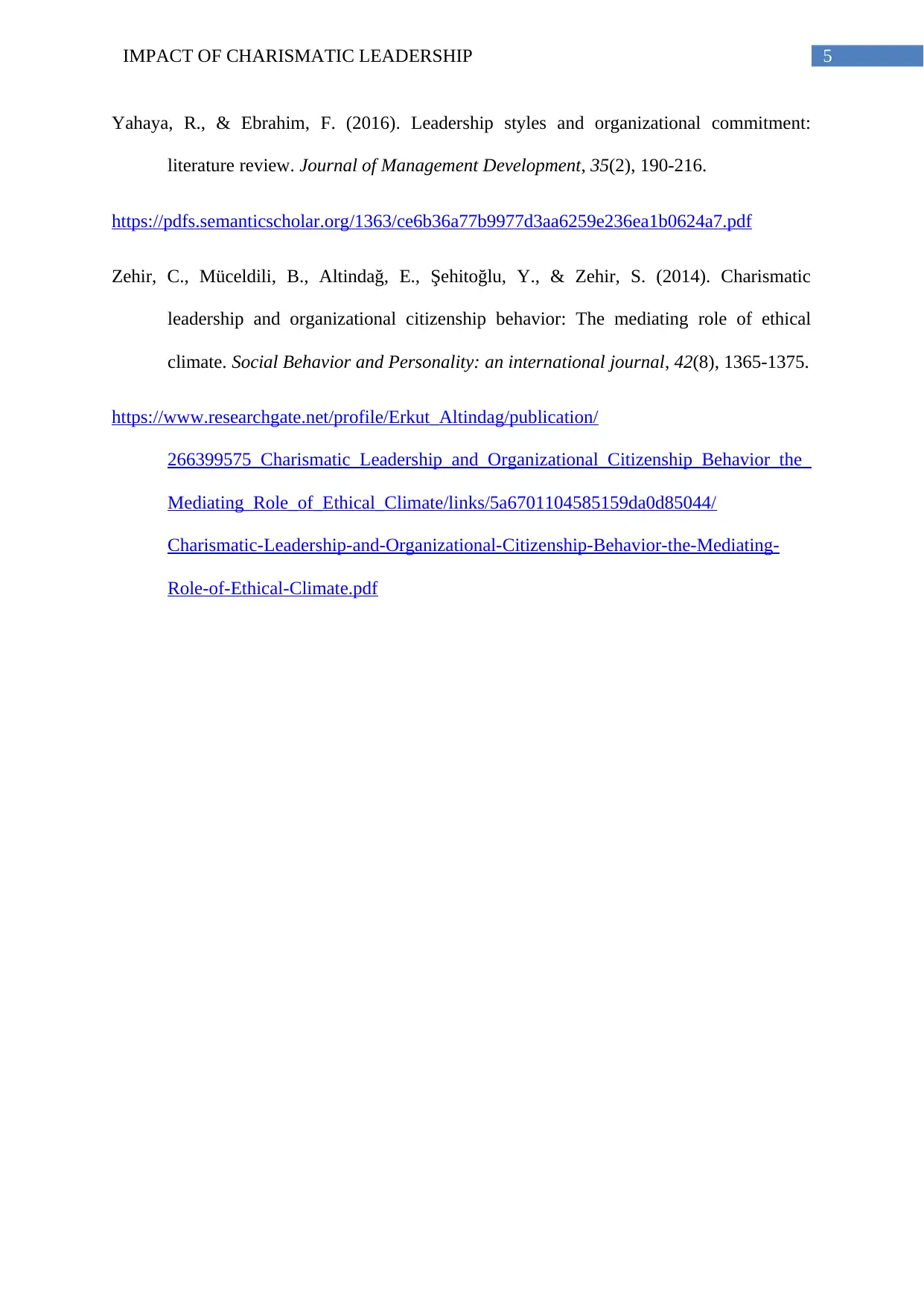
5IMPACT OF CHARISMATIC LEADERSHIP
Yahaya, R., & Ebrahim, F. (2016). Leadership styles and organizational commitment:
literature review. Journal of Management Development, 35(2), 190-216.
https://pdfs.semanticscholar.org/1363/ce6b36a77b9977d3aa6259e236ea1b0624a7.pdf
Zehir, C., Müceldili, B., Altindağ, E., Şehitoğlu, Y., & Zehir, S. (2014). Charismatic
leadership and organizational citizenship behavior: The mediating role of ethical
climate. Social Behavior and Personality: an international journal, 42(8), 1365-1375.
https://www.researchgate.net/profile/Erkut_Altindag/publication/
266399575_Charismatic_Leadership_and_Organizational_Citizenship_Behavior_the_
Mediating_Role_of_Ethical_Climate/links/5a6701104585159da0d85044/
Charismatic-Leadership-and-Organizational-Citizenship-Behavior-the-Mediating-
Role-of-Ethical-Climate.pdf
Yahaya, R., & Ebrahim, F. (2016). Leadership styles and organizational commitment:
literature review. Journal of Management Development, 35(2), 190-216.
https://pdfs.semanticscholar.org/1363/ce6b36a77b9977d3aa6259e236ea1b0624a7.pdf
Zehir, C., Müceldili, B., Altindağ, E., Şehitoğlu, Y., & Zehir, S. (2014). Charismatic
leadership and organizational citizenship behavior: The mediating role of ethical
climate. Social Behavior and Personality: an international journal, 42(8), 1365-1375.
https://www.researchgate.net/profile/Erkut_Altindag/publication/
266399575_Charismatic_Leadership_and_Organizational_Citizenship_Behavior_the_
Mediating_Role_of_Ethical_Climate/links/5a6701104585159da0d85044/
Charismatic-Leadership-and-Organizational-Citizenship-Behavior-the-Mediating-
Role-of-Ethical-Climate.pdf
⊘ This is a preview!⊘
Do you want full access?
Subscribe today to unlock all pages.

Trusted by 1+ million students worldwide
1 out of 6
Related Documents
Your All-in-One AI-Powered Toolkit for Academic Success.
+13062052269
info@desklib.com
Available 24*7 on WhatsApp / Email
![[object Object]](/_next/static/media/star-bottom.7253800d.svg)
Unlock your academic potential
Copyright © 2020–2025 A2Z Services. All Rights Reserved. Developed and managed by ZUCOL.





